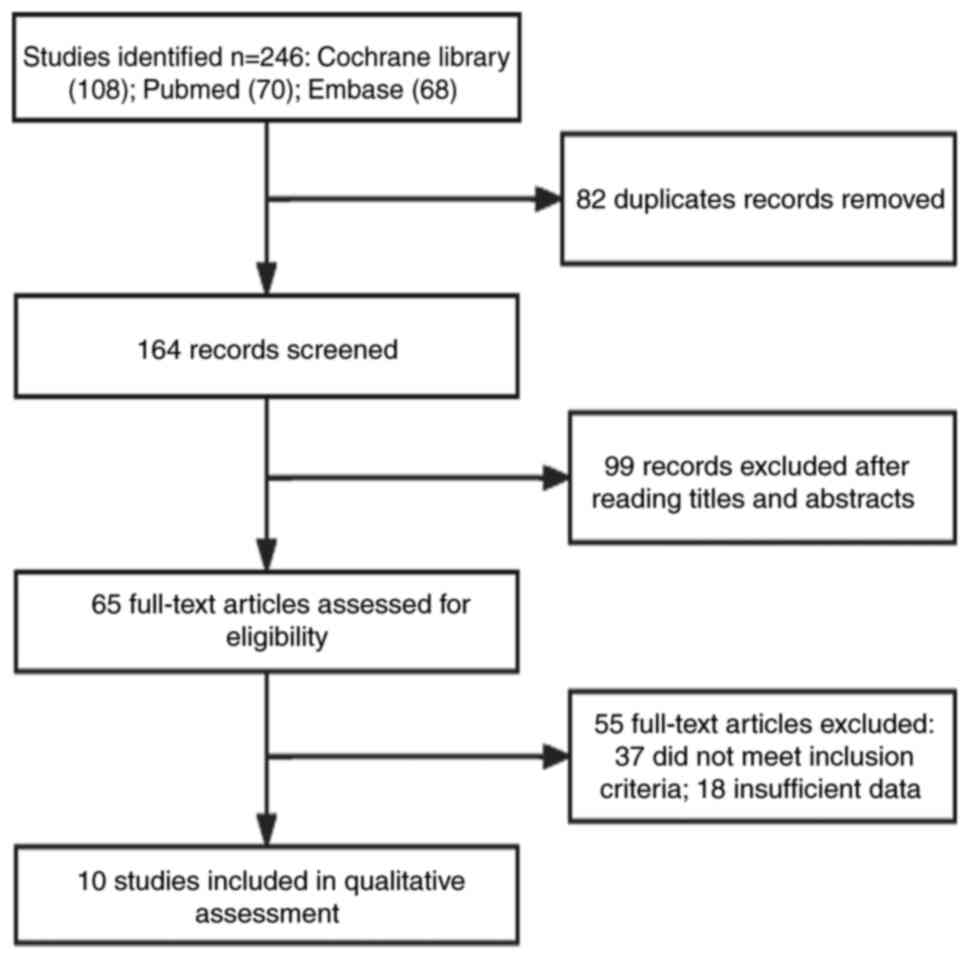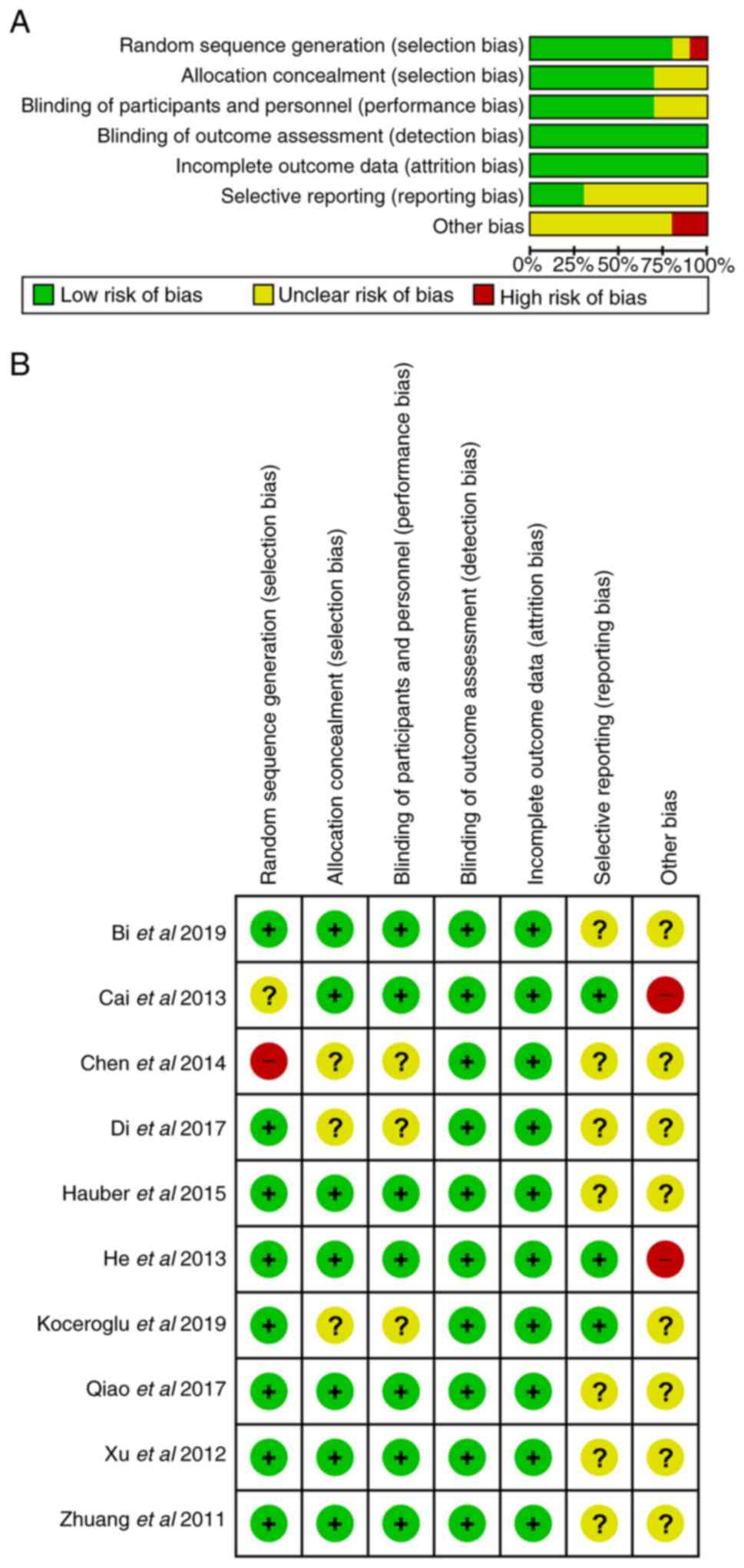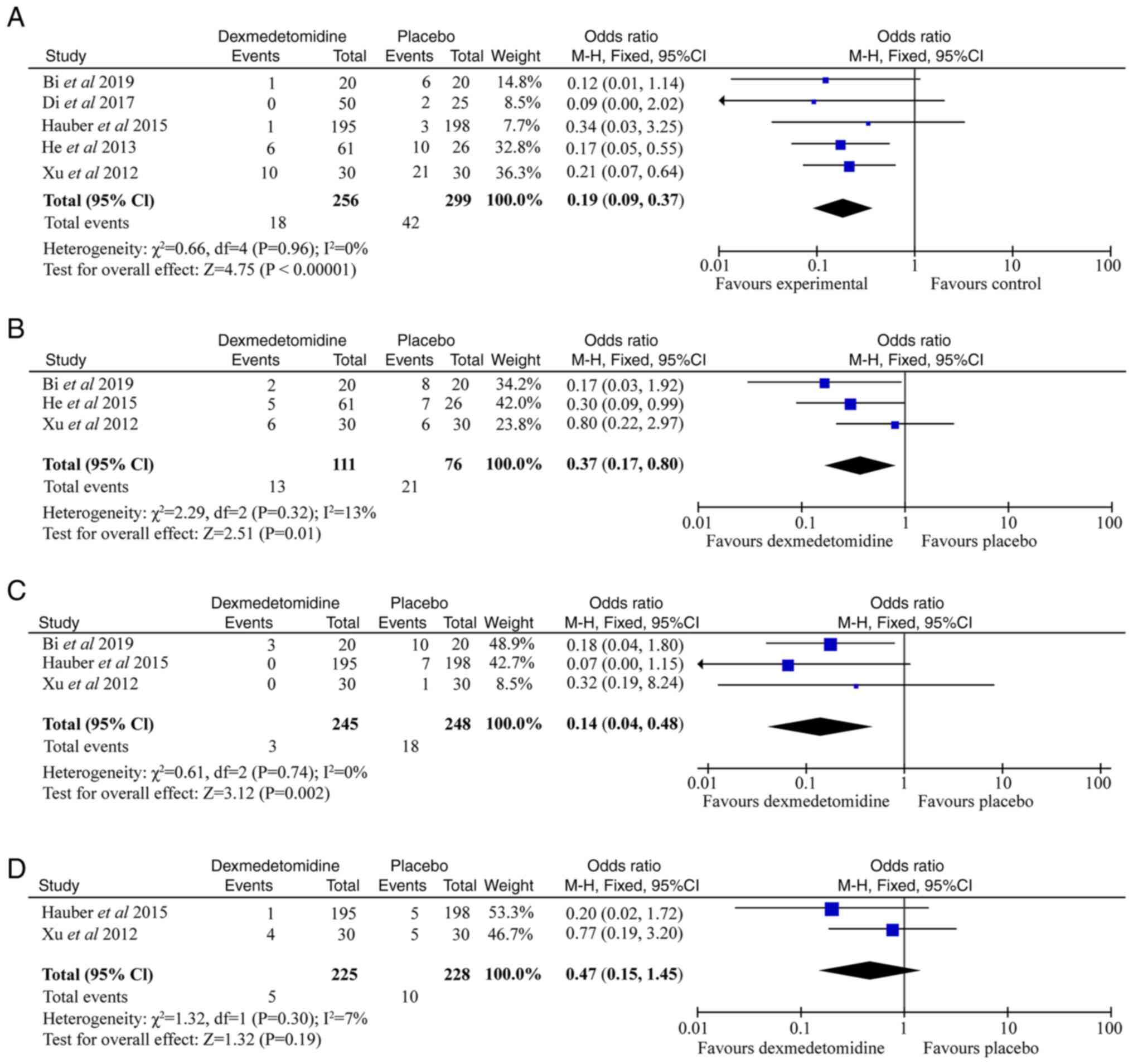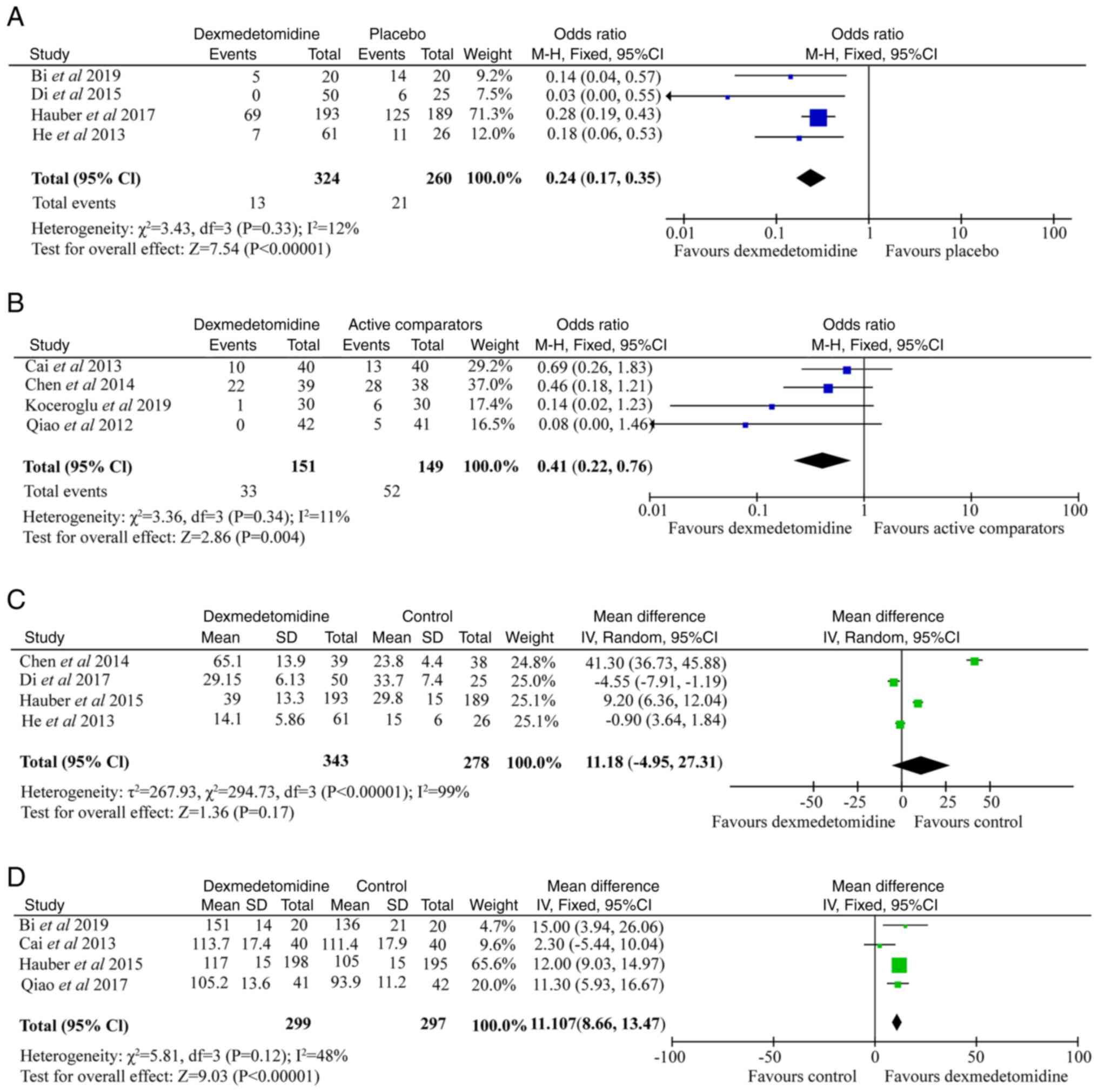|
1
|
Li L, Zhang Z, Yao Z, Wang HJ, Wang HB, An
H and Yao J: The impact of laryngeal mask versus other airways on
perioperative respiratory adverse events in children: A systematic
review and meta-analysis of randomized controlled trials. Int J
Surg. 64:40–48. 2019.PubMed/NCBI View Article : Google Scholar
|
|
2
|
Drake-Brockman TFE, Ramgolam A, Zhang G,
Hall GL and von Ungern-Sternberg BS: The effect of endotracheal
tubes versus laryngeal mask airways on perioperative respiratory
adverse events in infants: A randomised controlled trial. Lancet.
389:701–708. 2017.PubMed/NCBI View Article : Google Scholar
|
|
3
|
Gupta N, Rath GP, Prabhakar H and Dash HH:
Effect of intraoperative dexmedetomidine on postoperative recovery
profile of children undergoing surgery for spinal dysraphism. J
Neurosurg Anesthesioly. 25:271–278. 2013.PubMed/NCBI View Article : Google Scholar
|
|
4
|
Bong CL, Tan J, Lim S, Low Y, Sim SW,
Rajadurai VS, Khoo PC, Allen J, Meaney M and Koh WP: Randomised
controlled trial of dexmedetomidine sedation vs general anaesthesia
for inguinal hernia surgery on perioperative outcomes in infants.
Br J Anaesth. 122:662–670. 2019.PubMed/NCBI View Article : Google Scholar
|
|
5
|
Bhat R, Mudukanagoudar M, Shetty S and
Kamath S: Study of dose related effects of dexmedetomidine on
laryngeal mask airway removal in children-A double blind randomized
study. Anaesthesia Pain Intensive Care. 22:368–373. 2018.
|
|
6
|
Chrysostomou C and Schmitt CG:
Dexmedetomidine: Sedation, analgesia and beyond. Expert Opin Drug
Metab Toxicol. 4:619–627. 2008.PubMed/NCBI View Article : Google Scholar
|
|
7
|
Shi M, Miao S, Gu T, Wang D, Zhang H and
Liu J: Dexmedetomidine for the prevention of emergence delirium and
postoperative behavioral changes in pediatric patients with
sevoflurane anesthesia: A double-blind, randomized trial. Drug Des
Devel Ther. 13:897–905. 2019.PubMed/NCBI View Article : Google Scholar
|
|
8
|
Grant MJ, Schneider JB, Asaro LA, Dodson
BL, Hall BA, Simone SL, Cowl AS, Munkwitz MM, Wypij D and Curley
MA: Dexmedetomidine use in critically Ill children with acute
respiratory failure. Pediatr Crit Care Med. 17:1131–1141.
2016.PubMed/NCBI View Article : Google Scholar
|
|
9
|
Moher D, Shamseer L, Clarke M, Ghersi D,
Liberati A, Petticrew M, Shekelle P and Stewart LA: PRISMA-P Group.
Preferred reporting items for systematic review and meta-analysis
protocols (PRISMA-P) 2015 statement. Syst Rev. 4(1)2015.PubMed/NCBI View Article : Google Scholar
|
|
10
|
Peng K, Wu SR, Ji FH and Li J:
Premedication with dexmedetomidine in pediatric patients: A
systematic review and meta-analysis. Clinics (Sao Paulo).
69:777–786. 2014.PubMed/NCBI View Article : Google Scholar
|
|
11
|
Bi Y, Ma Y, Ni J and Wu L: Efficacy of
premedication with intranasal dexmedetomidine for removal of
inhaled foreign bodies in children by flexible fiberoptic
bronchoscopy: A randomized, double-blind, placebo-controlled
clinical trial. BMC Anesthesiol. 19(219)2019.PubMed/NCBI View Article : Google Scholar
|
|
12
|
Cai Y, Li W and Chen K: Efficacy and
safety of spontaneous ventilation technique using dexmedetomidine
for rigid bronchoscopic airway foreign body removal in children.
Paediatr Anaesth. 23:1048–1053. 2013.PubMed/NCBI View Article : Google Scholar
|
|
13
|
Chen KZ, Ye M, Hu CB and Shen X:
Dexmedetomidine vs remifentanil intravenous anaesthesia and
spontaneous ventilation for airway foreign body removal in
children. Br J Anaesth. 112:892–897. 2014.PubMed/NCBI View Article : Google Scholar
|
|
14
|
Di M, Han Y, Yang Z, Liu H, Ye X, Lai H,
Li J, ShangGuan W and Lian Q: Tracheal extubation in deeply
anesthetized pediatric patients after tonsillectomy: A comparison
of high-concentration sevoflurane alone and low-concentration
sevoflurane in combination with dexmedetomidine pre-medication. BMC
Anesthesiol. 17(28)2017.PubMed/NCBI View Article : Google Scholar
|
|
15
|
Hauber JA, Davis PJ, Bendel LP, Martyn SV,
McCarthy D, Ecans MC, Cladis FP, Cunningham S, Lang RS, Campbell
NF, et al: Dexmedetomidine as a rapid bolus for treatment and
prophylactic prevention of emergence agitation in anesthetized
Children. Anesth Analg. 121:1308–1315. 2015.PubMed/NCBI View Article : Google Scholar
|
|
16
|
He L, Wang X, Zheng S and Shi Y: Effects
of dexmedetomidine infusion on laryngeal mask airway removal and
postoperative recovery in children anaesthetised with sevoflurane.
Anaesth Intensive Care. 41:328–333. 2013.PubMed/NCBI View Article : Google Scholar
|
|
17
|
Koceroglu I, Devrim S, Bingol Tanriverdi T
and Gura Celik M: The effects of dexmedetomidine and tramadol on
post-operative pain and agitation, and extubation quality in
paediatric patients undergoing adenotonsillectomy surgery: A
randomized trial. J Clin Pharm Ther. 45:340–346. 2020.PubMed/NCBI View Article : Google Scholar
|
|
18
|
Qiao H, Xie Z and Jia J: Pediatric
premedication: A double-blind randomized trial of dexmedetomidine
or ketamine alone versus a combination of dexmedetomidine and
ketamine. BMC Anesthesiol. 17(158)2017.PubMed/NCBI View Article : Google Scholar
|
|
19
|
Lili X, Jianjun S and Haiyan Z: The
application of dexmedetomidine in children undergoing vitreoretinal
surgery. J Anest. 26:556–561. 2012.PubMed/NCBI View Article : Google Scholar
|
|
20
|
Zhuang PJ, Wang X, Zhang XF, Zhou ZJ and
Wang Q: Postoperative respiratory and analgesic effects of
dexmedetomidine or morphine for adenotonsillectomy in children with
obstructive sleep apnoea. Anaesthesia. 66:989–993. 2011.PubMed/NCBI View Article : Google Scholar
|
|
21
|
Mamie C, Habre W, Delhumeau C, Argiroffo
CB and Morabia A: Incidence and risk factors of perioperative
respiratory adverse events in children undergoing elective surgery.
Paediatr Anaesth. 14:218–224. 2004.PubMed/NCBI View Article : Google Scholar
|
|
22
|
Wang L, Wei L and Deng X: Other factors
affect the occurrence of perioperative respiratory adverse events.
Anesthesiology. 130:507–508. 2019.PubMed/NCBI View Article : Google Scholar
|
|
23
|
Steward DJ: Assessment of pediatric
patients for general anesthesia: The child with an upper
respiratory infection and the ex-premature infant. Semin Pediatr
Surg. 8:13–17. 1999.PubMed/NCBI View Article : Google Scholar
|
|
24
|
Al-Mazrou KA, Abdullah KM, ElGammal MS,
Ansari RA, Turkistani A and Abdelmeguid ME: Laryngeal mask airway
vs. uncuffed endotracheal tube for nasal and paranasal sinus
surgery: paediatric airway protection. Eur J Anaesthesiol.
27:16–19. 2010.PubMed/NCBI View Article : Google Scholar
|
|
25
|
Kaplan A, Crosby GJ and Bhattacharyya N:
Airway protection and the laryngeal mask airway in sinus and nasal
surgery. Laryngoscope. 114:652–655. 2004.PubMed/NCBI View Article : Google Scholar
|
|
26
|
Mason KP and Lerman J: Review article:
Dexmedetomidine in children: Current knowledge and future
applications. Anesth Analg. 113:1129–1142. 2011.PubMed/NCBI View Article : Google Scholar
|
|
27
|
Shukry M, Clyde MC, Kalarickal PL and
Ramadhyani U: Does dexmedetomidine prevent emergence delirium in
children after sevoflurane-based general anesthesia? Paediatr
Anaesth. 15:1098–1104. 2005.PubMed/NCBI View Article : Google Scholar
|
|
28
|
Sheta SA, Al-Sarheed MA and Abdelhalim AA:
Intranasal dexmedetomidine vs midazolam for premedication in
children undergoing complete dental rehabilitation: A
double-blinded randomized controlled trial. Paediatr Anaesth.
24:181–189. 2014.PubMed/NCBI View Article : Google Scholar
|
|
29
|
Pestieau SR, Quezado ZMN, Johnson YJ,
Anderson JL, Cheng YI, McCarter RJ, Choi S and Finkel J: High-dose
Dexmedetomidine increases the opioid-free interval and decreases
opioid requirement after tonsillectomy in children. Can J Anaesth.
58:540–550. 2011.PubMed/NCBI View Article : Google Scholar
|
|
30
|
Ni J, Wei J, Yao Y, Jiang X, Luo L and Luo
D: Effect of dexmedetomidine on preventing postoperative agitation
in children: A meta-analysis. PLoS One. 10(e0128450)2015.PubMed/NCBI View Article : Google Scholar
|
|
31
|
Guler G, Akin A, Tosun Z, Ors S, Esmaoglu
A and Boyaci A: Single-dose dexmedetomidine reduces agitation and
provides smooth extubation after pediatric adenotonsillectomy.
Paediatr Anaesth. 15:762–766. 2005.PubMed/NCBI View Article : Google Scholar
|
|
32
|
Mostafa MF, Abdel Aal FA, Ali IH, Ibrahim
AK and Herdan R: Dexmedetomidine during suprazygomatic maxillary
nerve block for pediatric cleft palate repair, randomized
double-blind controlled study. Korean J Pain. 33:81–89.
2020.PubMed/NCBI View Article : Google Scholar
|


















